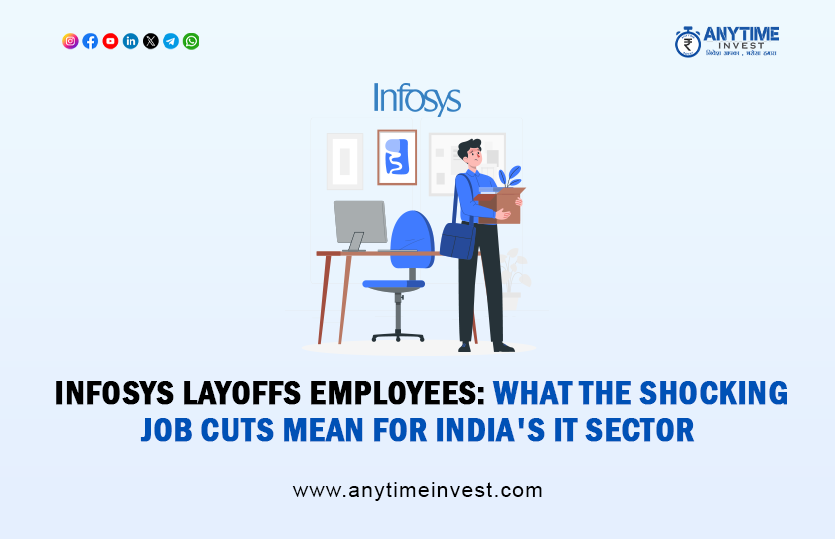
Infosys has recently announced major job reductions, a decision that has rippled through India’s IT sector, sparking widespread concern and debate from corporate boardrooms to everyday conversations. The phrase “Infosys layoffs employees” is now trending on social media, stirring a blend of fear, speculation, and analysis. But what exactly do these layoffs mean for the future of one of India’s most prominent IT giants, and how will it reshape the broader technology landscape in India?
A Wake-Up Call for the Indian IT Sector
When Infosys layoffs employees, it’s not just about numbers—it’s about impact. As one of the trailblazers of India’s IT boom, Infosys has long been regarded as a benchmark for consistency and progress. Layoffs at such a reputable firm hint at deeper structural changes within the company and the industry at large. Reports suggest the layoffs have affected employees across various verticals, including middle management and fresher-level roles.
This isn’t just an isolated move. This move follows a wave of similar decisions by other leading tech firms, pointing to an emerging pattern across the industry. The fact that Infosys layoffs employees right now, amidst a volatile global economic scenario, highlights the growing pressure on IT companies to streamline operations and cut costs.
Understanding the root causes behind the decision is crucial. Analysts suggest several factors:
1. Global Economic Slowdown – The IT industry heavily depends on international clients, particularly from the US and Europe. With clients tightening their budgets, Infosys, like many others, faces revenue pressures.
2. Automation and AI Integration – As AI tools and automation become more advanced, many traditional IT services are becoming obsolete. Infosys layoffs employees in roles that can be automated or restructured, focusing instead on upskilling and digital transformation.
3. Changing Client Demands – Today’s clients are looking for digital-first solutions, cybersecurity, cloud computing, and data analytics. Employees with legacy skills may no longer align with the firm’s strategic goals.
4. Post-Pandemic Normalization – During the pandemic, hiring spiked to manage increased demand. Now that demand is stabilizing, Infosys layoffs employees to recalibrate its workforce.
The fact that Infosys layoffs employees en masse has deeper implications. For one, it signals a transition from traditional IT services to a more skill-intensive, digitally agile workforce. This means:
• Higher emphasis on upskilling – Employees will need to invest more time in learning newer technologies like generative AI, blockchain, and cloud-native systems.
• Shift in hiring trends – Infosys and similar companies might hire fewer freshers but focus more on niche tech talent.
• A potential dip in morale – Layoffs often lead to a psychological impact, both for the employees who are let go and those who remain. Infosys must now manage its internal culture carefully.
When Infosys layoffs employees, other players in the Indian IT sector take note. Smaller firms and startups often follow trends set by industry leaders. As a result:
• Startups might delay hiring plans, fearing similar instability.
• Engineering colleges may see reduced campus recruitment, especially from major IT firms.
• Vendors and support services tied to IT firms may experience reduced demand, affecting a larger economic circle.
Furthermore, this move forces a re-evaluation of job security in the IT sector. What was once seen as a ‘safe’ career path is now being reexamined.
Infosys layoffs employees during a time when unemployment rates are already a concern in India. This has prompted some voices in government and industry associations to urge companies to explore alternatives before letting employees go. There's also a growing push for better regulatory frameworks and worker protection policies in the private tech sector.
Meanwhile, NASSCOM, the industry body for IT, has emphasized the need for reskilling initiatives, acknowledging that while roles are disappearing, new ones are being created just as fast. Infosys itself has launched several training programs, although these have yet to reach everyone impacted by the layoffs.
For IT professionals and aspirants, the Infosys layoffs employees story is a stark reminder to stay agile and future-proof. Here’s what can be done:
• Continue expanding your knowledge—prioritize in-demand technologies such as artificial intelligence, machine learning, cybersecurity, and DevOps.
• Diversify skill sets – Soft skills, project management, and business acumen are increasingly valuable.
• Freelancing and gig opportunities – With platforms enabling remote work, IT pros can explore global freelancing gigs.
• Startups and entrepreneurship – The current shake-up may also encourage some to start their own ventures, contributing to innovation in the sector.
The fact that Infosys layoffs employees is not just a corporate headline—it’s a sign of transformation. While painful, it may be necessary for long-term agility and competitiveness in a fast-evolving tech world. For employees, the key takeaway is to adapt, learn, and evolve. For Infosys and the broader industry, it's a wake-up call to lead with both efficiency and empathy.
As the Indian IT sector stands at this critical juncture, the way forward will depend not just on business strategies but also on how the workforce and leadership respond to these new realities. While the future remains unpredictable, those who stay flexible and think ahead may uncover promising new possibilities.